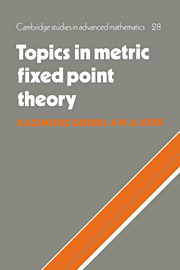Book contents
- Frontmatter
- Contents
- Preface
- 1 Preliminaries
- 2 Banach's Contraction Principle
- 3 Nonexpansive mappings: introduction
- 4 The basic fixed point theorems for nonexpansive mappings
- 5 Scaling the convexity of the unit ball
- 6 The modulus of convexity and normal structure
- 7 Normal structure and smoothness
- 8 Conditions involving compactness
- 9 Sequential approximation techniques for nonexpansive mappings
- 10 Weak sequential approximations
- 11 Properties of fixed point sets and minimal sets
- 12 Special properties of Hilbert space
- 13 Applications to accretivity
- 14 Ultrafilter methods
- 15 Set-valued mappings
- 16 Uniformly lipschitzian mappings
- 17 Rotative mappings
- 18 The theorems of Brouwer and Schauder
- 19 Lipschitzian mappings
- 20 Minimal displacement
- 21 The retraction problem
- Appendix: notes and comments
- References
- Index
9 - Sequential approximation techniques for nonexpansive mappings
Published online by Cambridge University Press: 21 October 2009
- Frontmatter
- Contents
- Preface
- 1 Preliminaries
- 2 Banach's Contraction Principle
- 3 Nonexpansive mappings: introduction
- 4 The basic fixed point theorems for nonexpansive mappings
- 5 Scaling the convexity of the unit ball
- 6 The modulus of convexity and normal structure
- 7 Normal structure and smoothness
- 8 Conditions involving compactness
- 9 Sequential approximation techniques for nonexpansive mappings
- 10 Weak sequential approximations
- 11 Properties of fixed point sets and minimal sets
- 12 Special properties of Hilbert space
- 13 Applications to accretivity
- 14 Ultrafilter methods
- 15 Set-valued mappings
- 16 Uniformly lipschitzian mappings
- 17 Rotative mappings
- 18 The theorems of Brouwer and Schauder
- 19 Lipschitzian mappings
- 20 Minimal displacement
- 21 The retraction problem
- Appendix: notes and comments
- References
- Index
Summary
As previous examples illustrate, neither iterative sequences nor approximate fixed point sequences for nonexpansive mappings typically converge, at least in the strong sense. However, in certain instances, these sequences may converge in the weak (or weak*) topology to fixed points, or in some other way determine invariant sets which contain fixed points.
Throughout this chapter we shall, as usual, assume that K is a nonempty, closed and convex subset of a Banach space X but, in general, we shall not assume K is bounded.
Suppose T: K→K is nonexpansive and fix x0 ∈ K. We begin by considering the iterative sequence {xn} = {Tnx0}. The set of points O(x0) = {xn: n = 0, 1, …} is called the orbit of x0 under T, and its closure is called the closed orbit. Since T is nonexpansive, if O(x0) is bounded for at least one x0 ∈ K then all other orbits O(x), x ∈ K, are bounded. Thus the nonexpansive self-mappings of K fall into two categories: those with bounded orbits and those with unbounded orbits. Obviously all nonexpansive mappings having fixed points have bounded orbits. (Less obvious is the fact that in a finite dimensional Banach space O(x0) is bounded for a nonexpansive mapping T whenever {xn} has a convergent subsequence (see Roehrig and Sine, 1981).)
In our previous examples of fixed point free, nonexpansive mappings none of the interative sequences contain convergent subsequences. However Edelstein has shown (1964) that even if such convergent subsequences exist, a nonexpansive mapping may remain fixed point free.
- Type
- Chapter
- Information
- Topics in Metric Fixed Point Theory , pp. 87 - 103Publisher: Cambridge University PressPrint publication year: 1990



